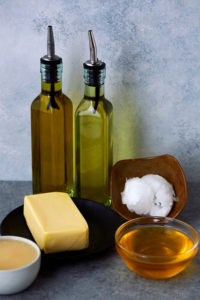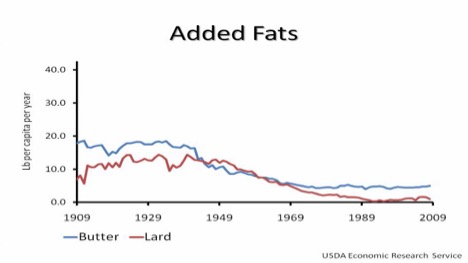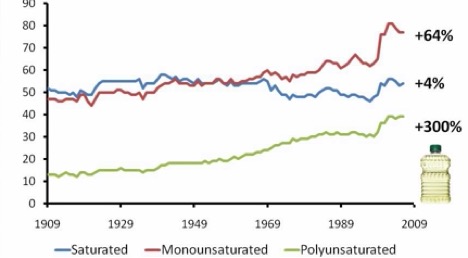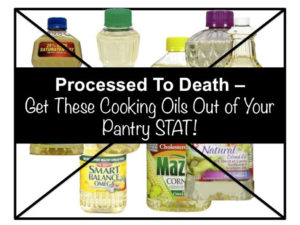Removing the Bad Fats
A couple of weeks ago we talked about the difference between good fats and bad fats. We learned that a good fat is any fat that occurs naturally in a food, such as the fat in meats, nuts, butter or avocados. We also learned that a bad fat is man-made fat that you should go to great lengths to eliminate from your diet.
Unfortunately, Americans have done just to opposite. Since 1909 we’ve dramatically reduced the amount of good fats we consume, and at the same time, we’ve increased the amount of bad fats in our diets. This change in fat consumption began in 1910 when Proctor & Gamble created a food product consisting of a vegetable oil (actually cottonseed oil), partially hydrogenated and hardened to a homogenous white or yellowish semi-solid closely resembling lard. The objective of this invention was to provide a new food product for a shortening in cooking. They named their new product Crisco, which they thought conjured up crispness, freshness, and cleanliness.

The folks at Proctor & Gamble knew it would be quite a task to convince homemakers to swap butter and lard for a new fat created in a factory, so they hired the J. Walter Thompson Agency, America’s first full-service advertising agency staffed by real artists and professional writers. Samples of Crisco were mailed to grocers, restaurants, nutritionists, and home economists. Eight marketing strategies were tested in different cities. Donuts were fried in Crisco and handed out in the streets. Women who purchased the new industrial fat got a free cookbook of Crisco recipes.
Health claims on food packaging was unregulated at the time, and copywriters claimed that cottonseed oil was healthier than animal fats for digestion. Advertisements in the Ladies’ Home Journal encouraged homemakers to try the new fat and “realize why its discovery will affect every family in America.” The novel marketing campaign resulted in sales of 2.6 million pounds of Crisco in 1912 and 60 million pounds just four years later.
Crisco did indeed touch the lives of every American. The substance was 50% trans fat, and it wasn’t until the 1990s that we understood how bad this was. It’s estimated that for every 2% increase in consumption of trans fat, the risk of heart disease increases by 23%.
Their marketing is still fooling people today. Crisco still promotes their hydrogenated cottonseed oil as a “vegetable oil.” Cotton certainly isn’t a vegetable. Just recently I was with a friend who was frying fish. When I asked him what kind of oil he was using, his response was, “vegetable oil; it’s healthier.”
This graph shows how Americans stopped consuming butter and lard after Crisco was introduced in 1910.

This graph shows how we’ve increased our consumption of man-made fats since 1910. Saturated fats are good animal fats. Monounsaturated fats include olive oil (a good fat since relatively little processing is involved in producing it), but they also include canola oil, safflower oil, sunflower oil, and sesame oil (bad fats because they are highly processed). Polyunsaturated fats are the most offensive because they are highly processed and high in trans fats.

As you can see from the two graphs, we’ve greatly reduced our consumption of good fats, and more than tripled our consumption of bad fats.
So how do we eliminate bad fats when food manufacturers are so clever? The best place to start is using common sense. If the food did not exist before 1900, it’s probably not anything you should eat. Or better yet, if your great grandmother wouldn’t have recognized it as a food, don’t eat it.
Read food labels and look for bad fats, even if the food claims to be healthy. If a food contains any of the following fats, it’s extremely harmful to your health.
- Canola oil
- Corn oil
- Cottonseed oil
- Grapeseed oil
- Hydrogenated oils
- Margarine
- Partially hydrogenated oils
- Peanut oil
- Rapeseed oil
- Safflower oil
- Sunflower oil
- Soybean oil
- Trans fats
- Vegetable shortening
 The troublesome thing is all of these man-made fats are marketed as “healthy.” I honestly believe man-made fats that have been promoted as “healthy” are the most harmful substances in the standard American diet.
The troublesome thing is all of these man-made fats are marketed as “healthy.” I honestly believe man-made fats that have been promoted as “healthy” are the most harmful substances in the standard American diet.
These fats increase inflammation, oxidative stress, and inflammatory cytokines—all which dramatically compromise your immune system. They also disrupt fat storage signaling in your body. Saturated fats (good fats from animals) turn on a signal in your fat cells that prompts you to stop eating. Man-made fats that are high in polyunsaturated fats actually turn that signal off. That’s why you can eat an entire bag of chips without stopping.
The worst thing about man-made fats is they are full of trans fats. Think of these as Frankenstein-type fats that don’t belong in your body. These “Frankenfats” can actually replace normal fats in your cell walls. This creates damaged cells which could ultimately lead to cancer. I believe the biggest cause of cancer is man-made fats.
So, back to removing bad fats from your diet. Here are a few more practical things you can do.
- Eat out as little as possible. It’s estimated that 40% of all calories from restaurant foods, whether fast food or fine dining, come from vegetable oils.
- If you eat out, ask that your food be cooked in butter, olive oil, coconut oil or lard.
- Choose “good” restaurants. For fast food we recommend Chipotle. For fine dining, choose a farm-to-table restaurant like Traders Point Creamery or Provision. Also, most traditional Mediterranean restaurants use lots of olive oil.
- Don’t use conventional salad dressings. Almost every salad dressing, no matter how healthy it claims to be, is full of soybean oil. If you are at a restaurant, ask for olive oil and vinegar. If it’s a farm-to-table restaurant, ask them if they make their own dressings and what ingredients they use. At home, use olive oil and vinegar or any of the amazing dressings from Primal Kitchen.
- Keep plenty of good fat around. Make sure you never run out of butter, olive oil, coconut oil and avocado oil. Also, save your bacon grease. Vegetables like kale, spinach and beets are all amazing when sauteed in pork fat.
- Finally, get rid of all of your bad fats. Throw them all away. They’re not real food.
Also, watch for our weekly recipes. We email new ones every Friday, and they only contain good fats.
Stay Strong and Healthy,
Bo Railey

